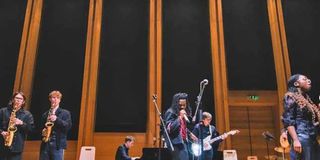Dr Chemical: Tanzanian rapper blends beats with brains

What you need to know:
- One minute she’s on stage delivering sharp rhymes about street life, feminism, and social justice; the next, she’s deep in scholarly research, interrogating how hip-hop can be used as a tool for education and community transformation.
When Claudia Lubao steps into a room, she brings with her two powerful worlds: the rhythmic confidence of “Chemical”, Tanzania’s fire-spitting female rapper, and the quiet authority of Dr. Lubao, a newly minted PhD holder from the University of St Andrews in Scotland.
Few can balance music and academia, but Chemical thrives in contradiction.
One minute she’s on stage delivering sharp rhymes about street life, feminism, and social justice; the next, she’s deep in scholarly research, interrogating how hip-hop can be used as a tool for education and community transformation.
“People always ask how I do both. The truth is, I’ve never seen music and education as separate. They’re both tools for transformation,” she says with a calm resolve.
Born and raised in Dar es Salaam, Chemical’s journey into music began as a teenager, influenced by the lyrical prowess of African hip-hop legends.
But even as her name began to rise in Tanzania’s rap scene, she nurtured a deep curiosity—one that pushed her beyond the studio and into the academic world.
Her PhD research focused on how scientific knowledge can be made more accessible to communities through music and popular culture.
She examined the communication gap between researchers and the public, arguing that language and format often make scientific findings unreachable for everyday people.
“I focused on how we can bridge the gap between scientists and the community. A lot of times, research doesn’t reach the people who need it, simply because of how we present it—through technical language, closed conferences, or workshops that don’t involve the public. I wanted to find ways to make that information accessible.”
During her academic years, Chemical took a different approach to music. Instead of traditional studio sessions, she explored performances in unconventional spaces. These experiences pushed her to focus more intentionally on structure, messaging, and cross-cultural understanding.
“Music doesn’t always have to mean going to the studio. I had to sacrifice a lot, but I was still very much involved—just in ways people don’t usually associate with music,” she explains.
She performed extensively, often in unlikely places. Collaborating with orchestras, she reimagined Bongo Flava tracks in orchestral form and worked with musicians who didn’t understand Swahili or Tanzanian slang. This required a new level of discipline and intentionality.
“It forced me to be very deliberate. Music became about more than just the vibe—it became about the message, the structure, and how it can be received even by people outside the culture.”
What began in studios evolved into a broader mission—teaching, performing, directing, and even influencing policy. For Claudia, music isn't just entertainment; it’s a medium for communicating complex ideas and engaging communities.
“Music is more than what we see in videos or hear on the radio. Even when I’m directing a performance or engaging the community through music, that’s still a way of communicating my ideas.”
Chemical has long used her platform to tackle difficult issues like gender inequality, youth unemployment, and corruption. But she’s also passionate about how hip-hop itself is perceived.
“We need to start respecting hip-hop as a tool for education, not just entertainment. Hip-hop has already evolved past the stage of just being a vibe—it’s a teaching tool. And I’m living proof of that.”
She sees her role not only as an artist but as a bridge between the classroom and the streets, between books and beats.
Juggling two demanding paths hasn’t been easy. She’s had to fight stereotypes in both.
“I’ve found myself in two tough sectors—hip-hop and academia,” she says. “With hip-hop, the biggest challenge is society’s expectations. The genre is still seen through a masculine lens, so even when women are doing great things, that strength isn’t always recognised.”
Yet those challenges, she believes, have made her stronger and more determined to push boundaries.
“Today, when people talk about Chem, they’re not just seeing a female rapper—they’re seeing someone who’s earned their place in hip-hop.”
Her rise to fame was sudden, but it never derailed her academic focus.
“One day I was just Claudia; the next day I woke up famous. But that didn’t stop me from going to class. It didn’t mean I was above being punished for missing a deadline. When I was in school, I wasn’t ‘Chemical’—I was just a student. I listened in class, submitted assignments, and worked like everyone else.”
Asked what she would name her life if it were a song, Chemical answers without hesitation:
“Today, I would call my song Bridge,” she says.

A reflection of her journey connecting art and education, community and science, passion and purpose.
“Because I, Claudia, have managed to connect Chemical and Claudia. I’ve connected what people see as art and education.”
Her story is about connection, about building bridges between seemingly distant worlds—and then walking across them.
Her advice to girls and young creatives is firm:
“Your talent doesn’t mean you should drop out of school. Education is a stage too—it’s your platform to grow. Unless leaving school is truly your calling, don’t quit. You can shine in both areas.”
Now, Dr. Chemical is thinking even bigger. While she’s proud of her academic and musical milestones, her eyes are set on empowering others.
“One of my biggest dreams for the coming years is to continue what I’m doing—but on even bigger platforms. I’d love to keep getting opportunities to speak at schools, universities, and different public spaces—places where I can talk to young people, to girls and boys who have dreams but aren’t sure if they can chase them while doing something else. I want those platforms so I can show them it’s possible.”
In a country where women are often boxed in by expectations, Claudia Lubao is living proof that the box can be broken. Whether she’s Chemical on the mic or Dr. Lubao in the lecture hall, her message is the same: you can be both.
“This isn’t the end,” she chuckles. “It’s just another verse in a much bigger song.”





